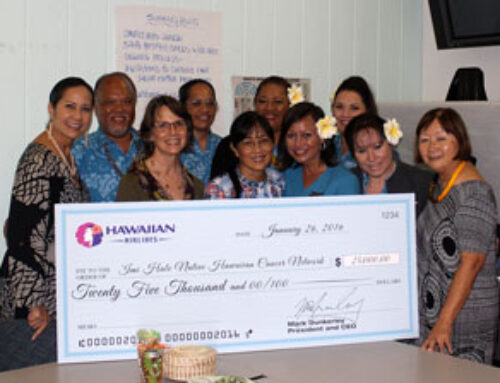(Kaka‘ako, Hawai‘i) Papa Ola Lōkahi, the Native Hawaiian Health Board, is joining with other Hawaiian health organizations and health care providers to emphasize the importance of research and data that accurately describes the health and wellness status for Kānaka Maoli, Hawai‘i’s indigenous community. We are gravely concerned to see cancer data for Native Hawaiians and Pacific Islanders (NHPI) reported in combination with Asian Americans (AA) in the just-released ACS Cancer Facts & Figures 2016, which includes a Special Section: Cancer in Asian Americans, Native Hawaiians, and Pacific Islanders.
Hawaiian health advocates have fought for nearly 30 years to raise awareness about the pronounced cancer health disparities among Native Hawaiians, some of which are the highest in the nation and certainly the highest in our state. The Hawaiian congressional delegation and health community contributed to the revision of the Office of Budget & Management Directive of 1997 (OMB 15), which charges federal agencies, institutes and offices with disaggregating AA and NHPI data. Furthermore, the Affordable Care Act requires that all federal data be collected and reported in accordance with the accepted population identifiers.
“Reporting aggregated data sabotages the gains we’ve made over the past 3 decades. It changes the mo‘olelo, or story, for us Kānaka Maoli,” asserts Dr. Noa Emmett Aluli, Molokai family physician and Vice-President of the ‘Ahahui o nā Kauka, Association of Native Hawaiian Physicians. “Unfortunately it can lead to inappropriate education, treatment strategies, and misallocation of resources and efforts.”
Examples of community harm that is perpetuated by aggregating NH and AA cancer data:
- The Special Section on AANHPI, 2016 reports that “Cancer is the leading cause of death among AANHPIs…” In fact, while Native Hawaiians carry the highest cancer mortality burden in Hawai‘i, heart disease is the leading cause of death among Native Hawaiians (Aluli et al, 2010).
- The Special Section also reports “Breast cancer incidence and death rates are reported to be 30 to 50%lower for AANHPI.” Breast cancer incidence among Hawaiian women is 24% higher than for whites, 60% higher than for Chinese, and 12.4% higher than for Japanese. Breast cancer mortality rates in Hawai‘i are 31% higher than for whites, 127% higher than for Chinese, and 85% higher than for Japanese. The rates are even more disparate among Pacific Islanders, such as women from the Marshall Islands (Hawaii Cancer Facts and Figures, 2010).
“We understand researchers’ concern for stable data sets to produce reliable data, but Hawai‘i has participated in the Nation Cancer Institute’s Surveillance, Epidemiology, and End Results (SEER) Program since SEER’s inception. As such, significant incidence and mortality data on Native Hawaiians in Hawai‘i are available,” clarifies Dr. Kathryn Braun, co-Principal Investigator of ‘Imi Hale Native Hawaiian Cancer Network (‘Imi Hale).
Hardy Spoehr, former Executive Director of Papa Ola Lōkahi, has been a long standing champion of this issue. “It’s disappointing that aggregation of NH data with that of AA is still prevalent in federal data reporting. American Cancer Society is an internationally respected organization and needs to be a leader in this realm of data presentation, not a perpetuator of harmful reporting practices that have made it so difficult for the Hawaiian community to raise awareness about its cancer burden.”
Misrepresented data promotes harmful perceptions about the health status and health needs of the Hawaiian community. All minority and small groups who are not equitably represented in national data collection and reporting are victims of this harmful practice.
Papa Ola Lōkahi will remain diligent about raising awareness about this and we ask our local and national partners and colleagues to do the same.
Jo Ann U. Tsark, MPH
Project Director
‘Imi Hale – Native Hawaiian Cancer Network
(808) 721-7511
Kathryn L. Braun, PhD
Co-Principal Investigator
‘Imi Hale – Native Hawaiian Cancer Network
(808) 330-1759
# # #

